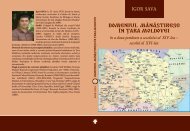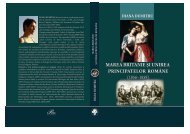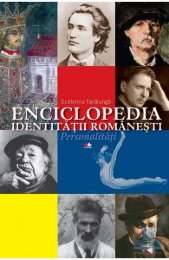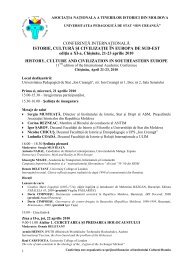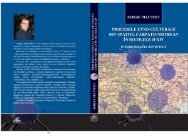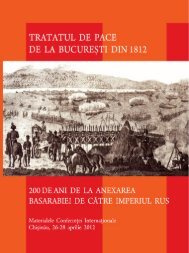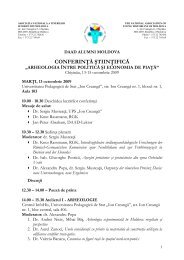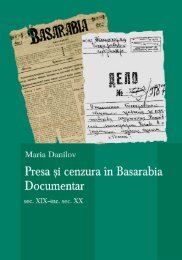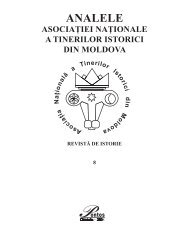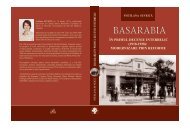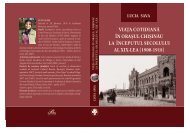Document PDF - Asociatia Tinerilor Istorici din Moldova
Document PDF - Asociatia Tinerilor Istorici din Moldova
Document PDF - Asociatia Tinerilor Istorici din Moldova
Erfolgreiche ePaper selbst erstellen
Machen Sie aus Ihren PDF Publikationen ein blätterbares Flipbook mit unserer einzigartigen Google optimierten e-Paper Software.
time the strategy was to attract learned persons from elsewhere to fi ll various jobs in the town,<br />
this policy eventually changed. Local potential was invested in supporting the studies of sons<br />
of well positioned families. After the Reformation, towns began to apply a so-called combined<br />
policy: attracting former students from other locations supplemented by investment into future<br />
local intellectuals, the latter tendency gradually gaining in importance.<br />
This article is meant to analyse the possibilities for fi nancial support students from Košice,<br />
a middle-size town in the sixteenth and seventeenth centuries’ Hungary (present-day Eastern<br />
Slovakia), had at their disposal to facilitate their attendance at universities abroad. The focus<br />
will be set on the urban council’s activity meant to supporting education during the Reformation<br />
period in the town. Aspects such as duration of the fi nancial support, categories of benefi -<br />
ciaries, amount of money granted, and further possibilities of support for university studies of<br />
the town inhabitants will be presented and commented upon. The text is based on the collection<br />
of inedite documents of various character from the urban archives in Košice (Archív Mesta<br />
Košic, abbreviated AMK).<br />
Duration of fi nancial support<br />
Košice, a middle sized town with about 3000 inhabitants by the end of the fi fteenth century,<br />
was located along the important commercial route between Transylvania, northern Hungary,<br />
and Poland, not far from Poland’s greatest commercial town, Cracow, a fact that allowed<br />
its rapid economic growth and earned it an important role in the internal and external trade of<br />
the region at the time. Reformation was accepted relatively early, so that by the 1550s, almost<br />
the entire town’s population was adept of the Protestant faith. It was also the time when the<br />
town council of Košice started to be actively involved in the education abroad of its citizens. It<br />
is not easy to establish if the town had a rigid policy of granting fi nancial support for the studies<br />
of its inhabitants. Accor<strong>din</strong>g to the letters and other types of documents preserved in the town<br />
archives, several scenarios for getting fi nancial aid existed and several categories of benefi -<br />
ciaries could be established. It is not possible to reconstruct the story in each case: it occurs<br />
sometimes that only one letter from a certain person is present, usually a request for money,<br />
and it is not clear if a response ever followed through or not. The entries in the town protocols<br />
do not record anything in relation to many of the identifi ed cases either. However, there are a<br />
number of persons for whom a sequence of events can be re-established to some extent using<br />
a number of documents of various content, relating interesting details connected to support<br />
received from the town council.<br />
A number of cases could be determined where a student would be fi nanced over an<br />
extended period of time beginning from his secondary studies at one of the urban schools in<br />
Košice or in the region, to the completion of his studies at one of the Protestant universities.<br />
A good example of such a student is Georgius Buntzler, who received fi nancial help from the<br />
town council beginning from the time he attended the urban school in Jihlava, Moravia and<br />
continuing throughout his academic stay at the University of Wittenberg. Buntzler was a member<br />
of a well-to-do burgher’s family in Košice, a son of Michael Buntzler, member of the town<br />
council from 1565 to 1584 8 and a relative of Caspar Schneider, member of the town council<br />
from 1574 to 1593. 9 Nine letters are preserved in the Košice collection related to the academic<br />
progress of this student, of which seven were written by Buntzler himself. The fi rst letter, dated<br />
September 30, 1583 was sent from Jihlava where Buntzler was pursuing his secondary studies.<br />
10 In this letter, the young man mentioned that he was writing to the town council as suggested<br />
by his father, in order to express his gratitude for the fi nancial support provided up to<br />
that time. From another letter it is evident that Georgius Buntzler was sent to Jihlava with much<br />
8<br />
NÉMETH 2006, see also AMK, H III/2, her.1, f. 100r, v, 101r.<br />
9<br />
NÉMETH 2006, see also the letter sent by Schneider to Buntzler, from Košice, in 1589: AMK H I, no. n/a.<br />
10<br />
AMK H I, no. 3772/115.<br />
– 205 –



